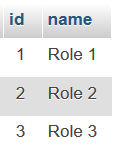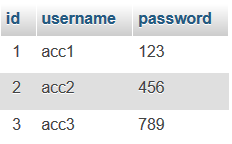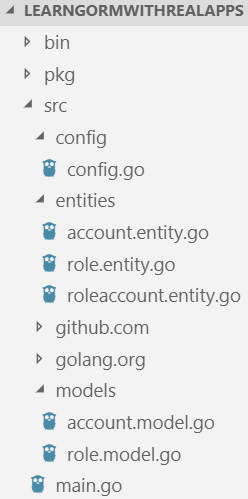Install Libraries
Make sure Git is installed on your machine and in your system’s PATH. Install the package to your $GOPATH with the go tool from shell:
$ go get github.com/go-sql-driver/mysql
$ go get -u github.com/jinzhu/gorm
Create Database
Create a database with the name is learngorm. This database have 1 tables: Product table.
--
-- Table structure for table `account`
--
CREATE TABLE `account` (
`id` int(11) NOT NULL PRIMARY KEY AUTO_INCREMENT,
`username` varchar(250) NOT NULL,
`password` varchar(250) NOT NULL
) ENGINE=InnoDB DEFAULT CHARSET=latin1;
--
-- Dumping data for table `account`
--
INSERT INTO `account` (`username`, `password`) VALUES
('acc1', '123'),
('acc2', '456'),
('acc3', '789');
-- --------------------------------------------------------
--
-- Table structure for table `role`
--
CREATE TABLE `role` (
`id` int(11) NOT NULL PRIMARY KEY AUTO_INCREMENT,
`name` varchar(250) NOT NULL
) ENGINE=InnoDB DEFAULT CHARSET=latin1;
--
-- Dumping data for table `role`
--
INSERT INTO `role` (`name`) VALUES
('Role 1'),
('Role 2'),
('Role 3');
-- --------------------------------------------------------
--
-- Table structure for table `role_account`
--
CREATE TABLE `role_account` (
`account_id` int(11) NOT NULL,
`role_id` int(11) NOT NULL,
`status` tinyint(1) NOT NULL,
PRIMARY KEY (`account_id`,`role_id`)
) ENGINE=InnoDB DEFAULT CHARSET=latin1;
--
-- Dumping data for table `role_account`
--
INSERT INTO `role_account` (`account_id`, `role_id`, `status`) VALUES
(1, 1, 1),
(1, 2, 1),
(1, 3, 1),
(2, 1, 0),
(2, 2, 0),
(3, 3, 1);
Structure of Role Table

Data of Role Table

Structure of Account Table

Data of Account Table

Structure of Role_Account Table

Data of Role_Account Table

Create Entities
Create new folder named src. In src folder, create new folder named entities. In this folder, create new entities as below:
Role Entity
In entities folder, create new go file named role.entity.go as below:
package entities
import "fmt"
type Role struct {
Id int `gorm:"primary_key, AUTO_INCREMENT"`
Name string
RoleAccounts []RoleAccount `gorm:"ForeignKey:RoleID"`
}
func (role *Role) TableName() string {
return "role"
}
func (role Role) ToString() string {
return fmt.Sprintf("id: %d\nname: %s", role.Id, role.Name)
}
Account Entity
In entities folder, create new go file named account.entity.go as below:
package entities
import "fmt"
type Account struct {
Id int `gorm:"primary_key, AUTO_INCREMENT"`
Username string
Password string
RoleAccounts []RoleAccount `gorm:"foreignkey:AccountID"`
}
func (account *Account) TableName() string {
return "account"
}
func (account Account) ToString() string {
return fmt.Sprintf("id: %d\nusername: %s", account.Id, account.Username)
}
RoleAccount Entity
In entities folder, create new go file named roleaccount.entity.go as below:
package entities
import "fmt"
type RoleAccount struct {
RoleID int `gorm:"primary_key; column:role_id"`
AccountID int `gorm:"primary_key; column:account_id"`
Status bool
Role Role
Account Account
}
func (roleAccount *RoleAccount) TableName() string {
return "role_account"
}
func (roleAccount RoleAccount) ToString() string {
return fmt.Sprintf("role id: %d\naccount id: %d\nstatus: %t", roleAccount.RoleID, roleAccount.AccountID, roleAccount.Status)
}
Create Config
In src folder, create new folder named config. In this folder, create new file named config.go, this file is used to connect mysql database:
package config
import (
"github.com/jinzhu/gorm"
_ "github.com/jinzhu/gorm/dialects/mysql"
)
func GetDB() (*gorm.DB, error) {
dbDriver := "mysql"
dbName := "learngorm"
dbUser := "root"
dbPassword := "123456"
db, err := gorm.Open(dbDriver, dbUser+":"+dbPassword+"@/"+dbName+"?charset=utf8&parseTime=True")
if err != nil {
return nil, err
}
return db, nil
}
Create Models
In src folder, create new folder named models. In models folder, create new models as below:
Account Model
In models folder, create new go file named account.model.go as below:
package models
import (
"config"
"entities"
)
type AccountModel struct {
}
func (accountModel AccountModel) FindAll() ([]entities.Account, error) {
db, err := config.GetDB()
if err != nil {
return nil, err
} else {
var accounts []entities.Account
db.Preload("RoleAccounts").Preload("RoleAccounts.Role").Find(&accounts)
return accounts, nil
}
}
Role Model
In models folder, create new go file named role.model.go as below:
package models
import (
"config"
"entities"
)
type RoleModel struct {
}
func (roleModel RoleModel) FindAll() ([]entities.Role, error) {
db, err := config.GetDB()
if err != nil {
return nil, err
} else {
var roles []entities.Role
db.Preload("RoleAccounts").Preload("RoleAccounts.Account").Find(&roles)
return roles, nil
}
}
Structure of Project

Run Application
In src folder, create new file named main.go as below and use go run main.go command to run program:
package main
import (
"fmt"
"models"
)
func main() {
fmt.Println("List the roles for each account")
ListRolesForEachAccount()
fmt.Println("List the account for each role")
ListAccountsForEachRole()
}
func ListRolesForEachAccount() {
var accountModel models.AccountModel
accounts, _ := accountModel.FindAll()
for _, account := range accounts {
fmt.Println(account.ToString())
fmt.Println("Roles: ", len(account.RoleAccounts))
fmt.Println("Languages")
for _, roleAccount := range account.RoleAccounts {
fmt.Println(roleAccount.Role.ToString())
fmt.Println("========================")
}
fmt.Println("----------------------")
}
}
func ListAccountsForEachRole() {
var roleModel models.RoleModel
roles, _ := roleModel.FindAll()
for _, role := range roles {
fmt.Println(role.ToString())
fmt.Println("Roles: ", len(role.RoleAccounts))
fmt.Println("Roles")
for _, roleAccount := range role.RoleAccounts {
fmt.Println(roleAccount.Account.ToString())
fmt.Println("========================")
}
fmt.Println("----------------------")
}
}
Output
List the roles for each account
id: 1
username: acc1
Roles: 3
Languages
id: 1
name: Role 1
========================
id: 2
name: Role 2
========================
id: 3
name: Role 3
========================
----------------------
id: 2
username: acc2
Roles: 2
Languages
id: 1
name: Role 1
========================
id: 2
name: Role 2
========================
----------------------
id: 3
username: acc3
Roles: 1
Languages
id: 3
name: Role 3
========================
----------------------
List the account for each role
id: 1
name: Role 1
Roles: 2
Roles
id: 1
username: acc1
========================
id: 2
username: acc2
========================
----------------------
id: 2
name: Role 2
Roles: 2
Roles
id: 1
username: acc1
========================
id: 2
username: acc2
========================
----------------------
id: 3
name: Role 3
Roles: 2
Roles
id: 1
username: acc1
========================
id: 3
username: acc3
========================
----------------------


